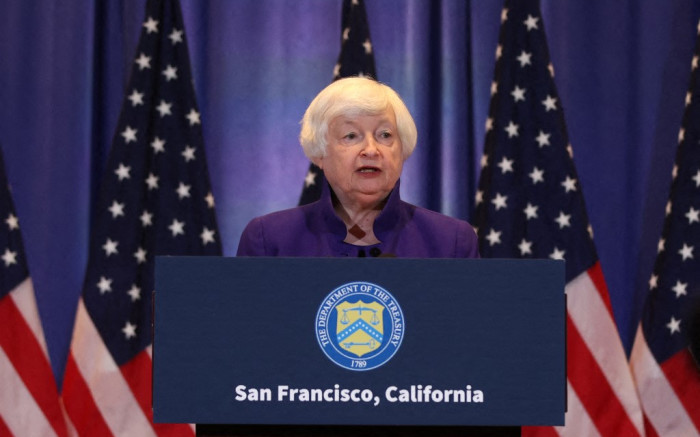
U.S. companies have long complained about what they see as an unfair business environment in China, with limited intellectual property protection and preferential treatment for domestic competitors.
U.S. Treasury Secretary Janet Yellen speaks during a press conference following a bilateral meeting with Vice Premier of the People’s Republic of China (PRC) He Lifeng at the Ritz Carlton Hotel on November 10, 2023 in San Francisco, California. Image: AFP
WASHINGTON, United States – U.S. Treasury Secretary Janet Yellen on Thursday called on China to move away from a state-led approach to economic policy, saying it could deter investors.
“An excessive role of state-owned enterprises can slow growth, and an excessive role of the security apparatus can discourage investment,” she added at the 50th anniversary dinner of the US China Business Council in Washington.
U.S. companies have long complained about what they see as an unfair business environment in China, with limited intellectual property protection and preferential treatment for domestic competitors.
Fears have been heightened this year by a crackdown on U.S. consulting firms operating in the country, and Washington is pushing for a more predictable business environment and a level playing field.
Citing a recent US-China Business Council member survey, Yellen pointed out that companies are rethinking their investment plans and said this should worry Beijing.
In the 2023 survey, a larger share of companies reported plans to move some operations out of China than in any other year since 2016.
The trends suggest it is potentially beneficial for China to “implement structural reforms,” Yellen said.
“For too long, American workers and businesses have not been able to compete on a level playing field with those in China,” she added.
“The PRC employs unfair economic practices, from non-market instruments to barriers to entry for foreign companies to coercive measures against American companies,” Yellen said, referring to the People’s Republic of China.
COPING “SHOCKS”.
Yellen also laid out priorities for U.S.-China economic relations in 2024, noting that relations between the world’s two largest economies will continue to face challenges.
“We are not trying to resolve all our differences or avoid all shocks. This is not realistic in any way,” she said.
But Yellen added that Washington is committed to “making our communications resilient.”
When both sides disagree and there are shocks, it would help “prevent misunderstandings from escalating and causing harm,” she said.
Officials have sought to ground relations as tensions have risen sharply in recent years – with both countries clashing over issues such as human rights and export controls.
President Joe Biden’s administration has taken some steps to ease tensions with visits to China by Secretary of State Antony Blinken, Yellen and Commerce Secretary Gina Raimondo.
In November, Biden and Chinese President Xi Jinping held an in-person summit and agreed to restore military communications.
At dinner on Thursday, ambassadors from both countries read letters from Biden and Xi. Biden noted that the global community expects US-China cooperation on issues such as climate change, while Xi raised a “promising future” for greater economic cooperation.
LOOKING FOR CLARITY
Yellen said her next trip to China as Treasury chief will include discussing “difficult areas of concern.”
She added that the United States will maintain its commitment to clear communication on issues such as restrictions on foreign investment and will continue to press China on national security issues.
Other priority areas include “pushing for clarity on China’s economic policies and policymaking to better inform our own decision-making.”
“It is crucial to understand China’s plans, particularly how China plans to respond to challenges related to local government debt and the real estate market, or how it might respond if unexpected weaknesses arise in its economy,” she added added.
The United States would also seek greater transparency about China’s non-market practices, Yellen said, and promote exchanges between financial regulators and on climate cooperation.






Recent Comments